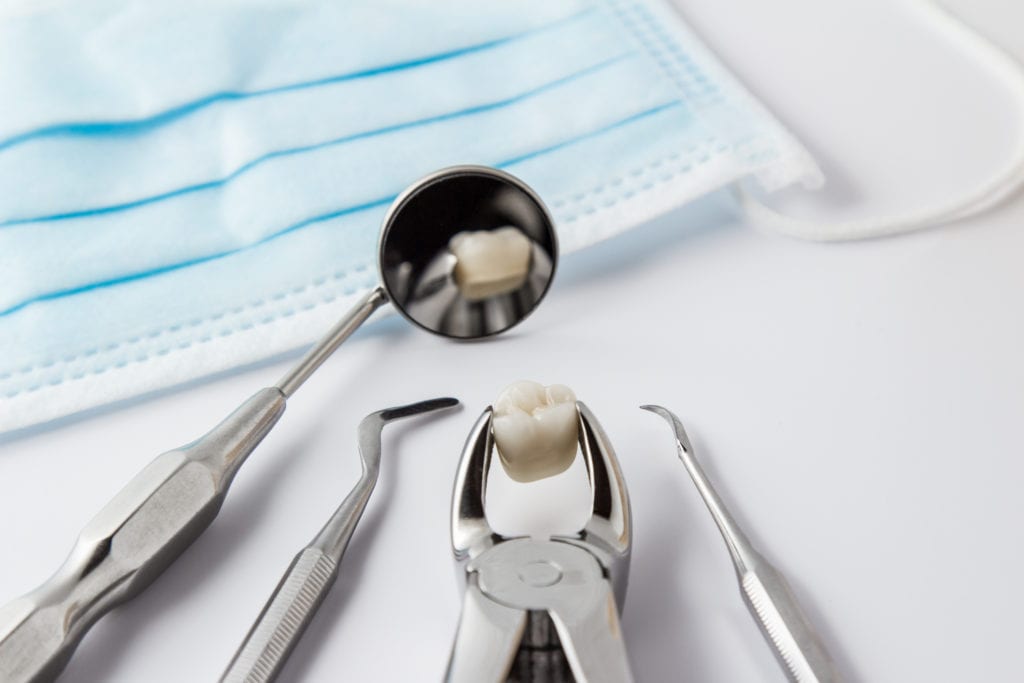Tooth extractions are necessary when the tooth has become badly damaged or overcrowded. Dr. Elise Brace provides tooth extractions and wisdom teeth removal to patients in her Cary, North Carolina, dental office. She is trained in viewing the teeth, gums, bones, and ligaments and understanding where to surgically remove the teeth. If you need a tooth extraction in Cary, NC, Dr. Brace can provide you with a simple extraction or a surgical extraction. We also provide general dentistry treatments to patients in Cary, North Carolina.
Common Reasons You May Need a Tooth Extraction
- Tooth decay
- Gum disease
- Creating space for teeth
- Damage due to accident or trauma
- Improved tooth alignment
- Removing extra teeth (wisdom teeth)
- Certain medical conditions


What Are Wisdom Teeth?
Wisdom teeth, or third molars, are the final set of molars that erupt in a patient’s mouth. They usually emerge during the teen years or early 20s. Most people develop four wisdom teeth, one in each corner of the mouth. However, some people may have fewer. Studies have shown that everyone has at least one-third molar.
The third set of molars appears later in life during a patient’s late teenage years. This time is often associated with growing past adolescence, becoming wiser, and gaining more wisdom. This timing of when the molars emerge is thought to be the origin of the term “wisdom teeth.”
Reasons for Wisdom Teeth Removal
It has become a staple to have your wisdom teeth taken out during your late teens and early 20s. This is because the third molars tend to cause a lot of issues. Removal is often recommended as a preventative measure to avoid potential problems. Even if they are not causing issues, Dr. Brace will recommend taking out your wisdom teeth instead of risking your oral health. Removing them will eliminate potential issues including:
- When the teeth do not have enough room to emerge, they become impacted in the jawbone or gums. This can lead to pain, swelling, and infection.
- The third molars will push against the other teeth causing misalignment or crowding if there is not room. This will interfere with orthodontic treatment or your bite.
- Since the third molars are so far back in your mouth, they are very difficult to clean, increasing the risk of cavities and gum disease.
- The wisdom teeth may develop and emerge at an angle, sometimes even horizontally, pushing against adjacent teeth causing pressure and pain.
- If your wisdom teeth become impacted, they can lead to the development of cysts or tumors. These conditions can cause permanent damage to your jawbone and surrounding teeth.
- Wisdom teeth can lead to severe pain, swelling, and discomfort as they erupt or become impacted.
Wisdom Teeth Recovery
Once the surgery completes, the effects of the anesthesia will wear off. Please make sure to have a person able to take you home from your appointment. We also recommend that you take at least two days off from work or school to recover.
During the consultation, our team will give you detailed after-care instructions. Use the prescribed pain relievers as directed and apply ice packs to the outside of your face where the surgery was performed to reduce swelling.
Soft food is advised for the first few days after the procedure. Also, please drink plenty of fluids to remain well hydrated. You must avoid using a straw for at least a week to prevent complications. The sucking motion can dislodge the blood clot in the extraction site leading to dry socket. This is a painful condition that will require further care.
Please refrain from smoking and drinking alcohol while recovering. These substances can hinder the healing process.
What are my Tooth Replacement Options?
If you have lost a tooth due to decay, damage, or trauma, Dr. Brace will review your options for replacement. Although she offers several solutions, dental implants in Cary, North Carolina are the number one tooth replacement option available today. They are the most natural-looking, offer the most oral health benefits, and will function like natural teeth.
Dental Implants
Teeth implants can successfully replace one, multiple, or all of your missing teeth after an extraction. A dental implant is a metal post that is surgically implanted into the jawbone. It acts as the replacement tooth root after a tooth has been extracted. It will support a dental restoration.
For a single missing tooth, one implant will be placed and used to secure a dental crown. If you are missing multiple consecutive teeth, two or more implants will be used to secure a dental bridge. If you have to have an entire arch of teeth extracted, then up to eight dental implants can be used to secure a denture.
Fixed Dental Bridge
Dr. Brace can also replace or several extracted teeth in a row with a fixed dental bridge. This type of dental restoration uses the teeth adjacent to the gap to support the prosthetic tooth (or teeth). This option does not require surgery but it will require altering the adjacent support teeth to create room for the bridge.
Removable Partial Denture
The least invasive option to replace extracted teeth is a partial denture. This prosthesis is removable. It is an acrylic and metal base with one or more false teeth attached to it that will fill in gaps in your smile. It has clasps that will snap on to remaining teeth to secure it in place.
While they are convenient and less costly, they may not offer the same stability or aesthetic appeal as implants or bridges.
Call Kildaire Family & Cosmetic Dentistry Today
Are you experiencing tooth pain, or have you suffered from damage or trauma to the mouth? Do you have impacted wisdom teeth? Schedule an appointment with Dr. Brace online or call 919.823.7107. Here, she will examine your teeth to determine if you need a tooth extraction to restore your dental health.
